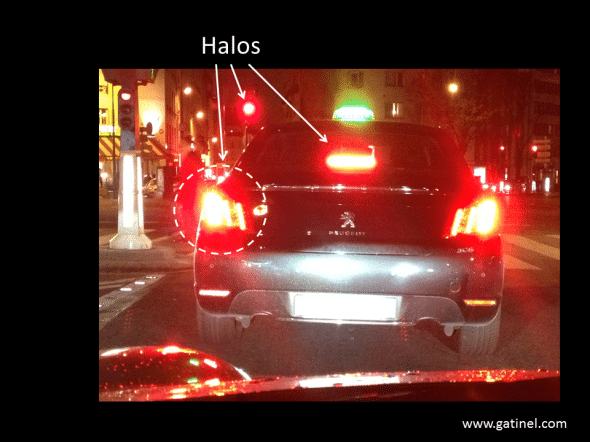Night Vision Problems: Halos, Blurred Vision, and Night Blindness
Are you having problems with night vision? Millions of Americans do. Poor night vision may simple be an early sign of progressive cataracts. Problems with night vision -- or at the extreme, night blindness -- may be treatable or could be a sign of a congenital problem such as retinitis pigmentosa or other more serious conditions.

What Causes Poor Night Vision?
Difficulty with night vision can also stem from exposure to the sun and vitamin deficiencies to a chronic disease such as diabetes:
Cataracts. The lens of the eye is located behind the pupil. Over a lifetime, the process of cell turnover inside the lens produces debris that gradually builds up. This creates a cataract. Painless and progressive, cataracts slowly cloud the lens.
The first symptom of cataracts is usually decreased night vision. The light distortion caused by cataracts also frequently produces halos around lights -- again, mostly at night. Blurry vision is also common.
Vitamin A deficiency . Vitamin A is an essential vitamin that's found in carrots and yellow or green leafy vegetables. It helps keep the retina -- in the back of the eye -- healthy. Vitamin A deficiency is a rare cause of night blindness in the U.S. It occurs mostly in people with problems absorbing nutrients from the gut. This might occur as a result of different diseases and conditions such as Crohn's disease, celiac disease, cystic fibrosis, or pancreatic insufficiency.
Zinc deficiency. Zinc works in the eye as a partner to vitamin A. Without zinc, the vitamin A hat's present may not be as effective, and night blindness could result. Beef, poultry, beans, and nuts are rich sources of zinc. This dietary deficiency is uncommon in this country.
Retinitis pigmentosa . Retinitis pigmentosa is an uncommon genetic disorder. It affects young people, usually before age 30. Worsening night vision is often the earliest symptom. Variable amounts of vision loss follow, although most people retain some vision.
Sunlight exposure. If your night vision seems temporarily worse after a trip to the beach, it probably is. Sustained bright sunlight can impair night vision for up to two days. Wear your sunglasses regularly to avoid this cause of poor night vision.

LASIK surgery problems. Complications after LASIK surgery are uncommon. However, some people do experience night vision problems after LASIK. The most common complaint is distorted vision in the form of glare and halos around objects.
 Distorted vision may be present during the day, too. It becomes more noticeable and bothersome, though, at night. Some people are more prone to developing night vision problems after LASIK. Those who are can be identified before the surgery based on characteristics of their eyes. Ask about your own chances of complications if you're considering LASIK. eResearch by Navid Ajamin -- summer 2011
Distorted vision may be present during the day, too. It becomes more noticeable and bothersome, though, at night. Some people are more prone to developing night vision problems after LASIK. Those who are can be identified before the surgery based on characteristics of their eyes. Ask about your own chances of complications if you're considering LASIK. eResearch by Navid Ajamin -- summer 2011
Diabetes. People with diabetes are at higher risk for night vision problems. Over years, high blood sugar is toxic to the blood vessels and nerves in the eye. The retina -- the back of the eye where images are focused -- is gradually damaged (retinopathy). Two early signs of retinopathy from diabetes are poor night vision and taking a long time to see normally after coming indoors from bright light outside.
Reference: webmd.com
 وبلاگ تخصصی عینک شامل مجموعه مطالب پزشکی است که اطلاعات مفیدی در رابطه با عینک , چشم، لنز، سلامتی چشم و راه های پیشگیری از بیماریهای چشمی، کنترل و درمان آن را در اختیار شما کاربر محترم می گزارد.
وبلاگ تخصصی عینک شامل مجموعه مطالب پزشکی است که اطلاعات مفیدی در رابطه با عینک , چشم، لنز، سلامتی چشم و راه های پیشگیری از بیماریهای چشمی، کنترل و درمان آن را در اختیار شما کاربر محترم می گزارد.